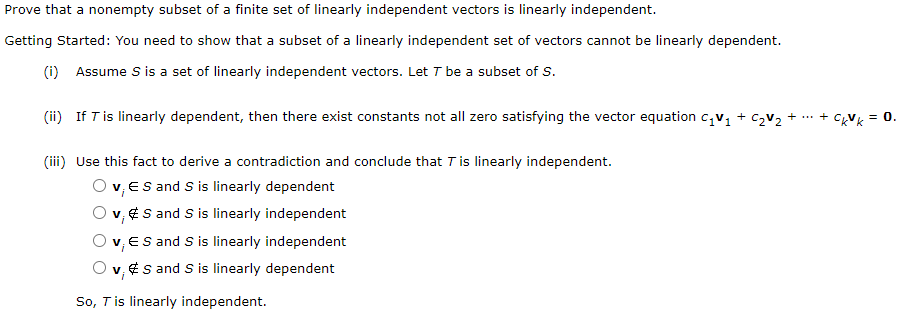Prove that a nonempty subset of a finite set of linearly independent vectors is linearly independent. Getting Started: You need to show that a subset of a linearly independent set of vectors cannot be linearly dependent. (i) Assume S i a set of linearly independent vectors. Let T be a subset of S. (ii) If Tis linearly dependent, then there exist constants not all zero satisfying the vector equation c,v, + c2v2 + ... + C&V¢ = 0. (iii) Use this fact to derive a contradiction and conclude that Tis linearly independent. O v, ES and S is linearly dependent v, ¢S and S is linearly independent v, ES and S is linearly independent v, ¢s and S is linearly dependent So, Tis linearly independent.
Prove that a nonempty subset of a finite set of linearly independent vectors is linearly independent. Getting Started: You need to show that a subset of a linearly independent set of vectors cannot be linearly dependent. (i) Assume S i a set of linearly independent vectors. Let T be a subset of S. (ii) If Tis linearly dependent, then there exist constants not all zero satisfying the vector equation c,v, + c2v2 + ... + C&V¢ = 0. (iii) Use this fact to derive a contradiction and conclude that Tis linearly independent. O v, ES and S is linearly dependent v, ¢S and S is linearly independent v, ES and S is linearly independent v, ¢s and S is linearly dependent So, Tis linearly independent.
Linear Algebra: A Modern Introduction
4th Edition
ISBN:9781285463247
Author:David Poole
Publisher:David Poole
Chapter2: Systems Of Linear Equations
Section2.3: Spanning Sets And Linear Independence
Problem 30EQ
Related questions
Question

Transcribed Image Text:Prove that a nonempty subset of a finite set of linearly independent vectors is linearly independent.
Getting Started: You need to show that a subset of a linearly independent set of vectors cannot be linearly dependent.
(i) Assume S i a set of linearly independent vectors. Let T be a subset of S.
(ii) If Tis linearly dependent, then there exist constants not all zero satisfying the vector equation c,v, + c2v + ... + CxVk = 0.
(iii) Use this fact to derive a contradiction and conclude that Tis linearly independent.
O v, ES and S is linearly dependent
v, ¢S and S is linearly independent
v, ES and S is linearly independent
v, ¢s and S is linearly dependent
So, Tis linearly independent.
Expert Solution
This question has been solved!
Explore an expertly crafted, step-by-step solution for a thorough understanding of key concepts.
This is a popular solution!
Trending now
This is a popular solution!
Step by step
Solved in 2 steps with 2 images

Recommended textbooks for you

Linear Algebra: A Modern Introduction
Algebra
ISBN:
9781285463247
Author:
David Poole
Publisher:
Cengage Learning

Elementary Linear Algebra (MindTap Course List)
Algebra
ISBN:
9781305658004
Author:
Ron Larson
Publisher:
Cengage Learning

Linear Algebra: A Modern Introduction
Algebra
ISBN:
9781285463247
Author:
David Poole
Publisher:
Cengage Learning

Elementary Linear Algebra (MindTap Course List)
Algebra
ISBN:
9781305658004
Author:
Ron Larson
Publisher:
Cengage Learning